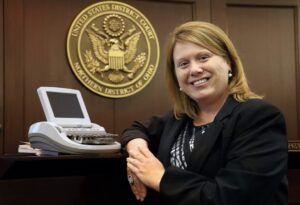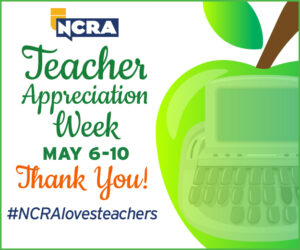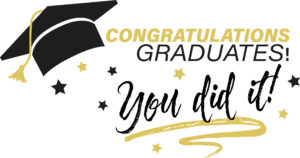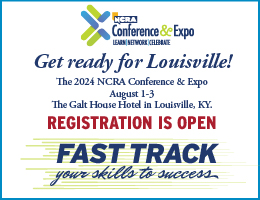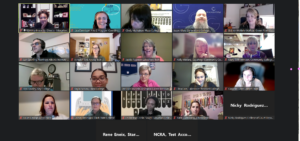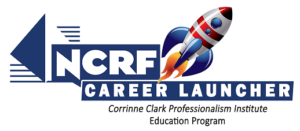The Council on Approved Student Education (CASE) is pleased to announce the winners of the 2018 CASE Scholarships. Ashley Stahl, a student at Gateway Community College in Phoenix, Ariz., has been awarded a $1,500 scholarship for first place. Four other scholarships were awarded: Courtney Petros, MacCormac College, Chicago, Ill., $1,000; Suzanne M. Stone, Bryan University, Tempe, Ariz., $750; Robin Rieger, Brown College of Court Reporting, Atlanta, Ga., $500; and Ann Marie Gibson, College of Court Reporting, Valparaiso, Ind., $250.

“I am so honored to receive this scholarship! I think it’s wonderful that the court reporting community offers so many scholarship opportunities like this for aspiring students. My state requires the Registered Professional Reporter (RPR) certification in order to work, so the prize money gives me the freedom to finish the last semester of school, take the legs of the RPR, and purchase professional equipment once I get certified. I plan to start my career as a freelance reporter in Phoenix,” said Stahl.
Each year, CASE awards several scholarships to students who attend an NCRA-approved court reporting program. To be eligible to apply, students must also hold a student membership in NCRA, have attained an exemplary academic record, and passed one skills test writing at between 140 and 180 words per minute. Students are also required to submit a speed verification form, three recommendation forms, a copy of their most recent transcript, and an essay in response to a topic chosen by members of CASE. The 2018 essay question was: “Pick an experience during your court reporting education and explain how it has influenced your development.”
In her essay, Stahl wrote about how common it is for court reporting students to fail tests as they progress in their education and how her failures have helped her become more successful.
“Failing tests is a way of life for court reporting students. However, I have come to appreciate that every failure offers an opportunity to learn and improve. By studying notes and scrutinizing tests, I have figured out where I am misstroking or hesitating in my writing.”

Courtney Petros, a student at MacCormac College in Chicago, was awarded a $1,000 scholarship.
“Winning this scholarship means that I can begin purchasing the equipment that I need in order to become a working court reporter. This scholarship has also given me the opportunity to attend the NCRA Convention in New Orleans,” Petros said.
“I am so excited for the opportunity to attend the convention so that I can network with other court reporters, learn new information at the seminars, and see what new technology exists in the court reporting field,” added Petros, who noted that he plans to work as a freelance court reporter upon graduation.
In his essay, Petros wrote about how his bachelor’s degree in psychology became an invaluable asset to him during court reporting school: “There are many highs and lows that a court reporting student feels. It is near impossible to explain the joy that you feel when you finally pass that 160 words-per-minute literary test that catapults you into a new speed. On the contrary, it is defeating when you miss passing a test by just one or two small errors. I realized early on that in order for me to be successful in school, it would not only require the coordination of my hands and mind, but also a strong relationship between my emotional responses and my ability to keep my mind clear.”
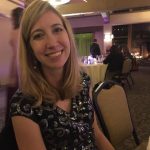
Suzanne M. Stone, a student at Bryan University in Tempe, Ariz., was awarded a $750 scholarship.
“I am extremely grateful to be receiving a CASE Student Scholarship. Court reporting school has been the most challenging goal I have undertaken, so being recognized in this field is an honor. As I near the end of school, I will be investing in a new laptop and professional software, and this scholarship will help tremendously with these purchases,” Stone said. “After graduating and attaining my certifications, I plan to work as a freelance reporter.”
In her essay, Stone wrote about how attending an NCRA convention helped her to overcome her tendency to be an introvert and meet fellow students: “Court reporting is such a different field of study, and sometimes it is difficult explaining the challenges to someone who is not in the field. Meeting my classmates and other students in person was comforting because you know that they understand what you are going through. I have become closer with some of my classmates as well, and I don’t think that would have happened if I had not attended the national and the state convention.”

Robin Rieger, a student at Brown College of Court Reporting in Atlanta, Ga., was awarded a $500 scholarship.
In her essay, Rieger wrote about how changing the structure of how she practiced improved the overwhelming task of cleaning up her writing and her dictionary, which laid a solid foundation for her ability to write in realtime: “The first time writing a dictation, I wrote for speed to see what I could get; but instead of continuing to speed drill, I changed my focus to the untranslated words and conflicts and immediately made those changes.”

Ann Marie Gibson, a student at the College of Court Reporting (CCR) in Valparaiso, Ind., has been awarded a $250 scholarship.
“I am honored to have won this scholarship from such a prestigious organization as the National Court Reporters Association. As a student with a full schedule, I have had to cut back on some of the hours that I work, so being awarded this scholarship helps to alleviate some of the financial burden associated with school,” said Gibson, who attends CCR as an online student.
“I would like to put this money towards a new desktop computer so the technology I have at home keeps up with my educational needs as well as my future career,” she added.
In her essay, Gibson wrote about a health scare part-way through her education that has aided her in successfully working toward graduating from court reporting school.
“Going back to school after 30 years has been the opportunity and challenge of a lifetime. I have learned as much about myself in the last year as I have about becoming a court reporter. One experience that has influenced my development as a student was a major health scare that happened near the end of my third semester at CCR,” she wrote. “I had a brush with death and blindness, and I had to learn to live by my new philosophy of the three Ps: Priorities, Permission, and Please, if I was going to successfully continue as a student.”
Gibson said she is still undecided about which area of court reporting she will pursue after graduation, although her ultimate goal is to work as an official court reporter or possibly as a CART (Communications Access Realtime Translation) captioner.

